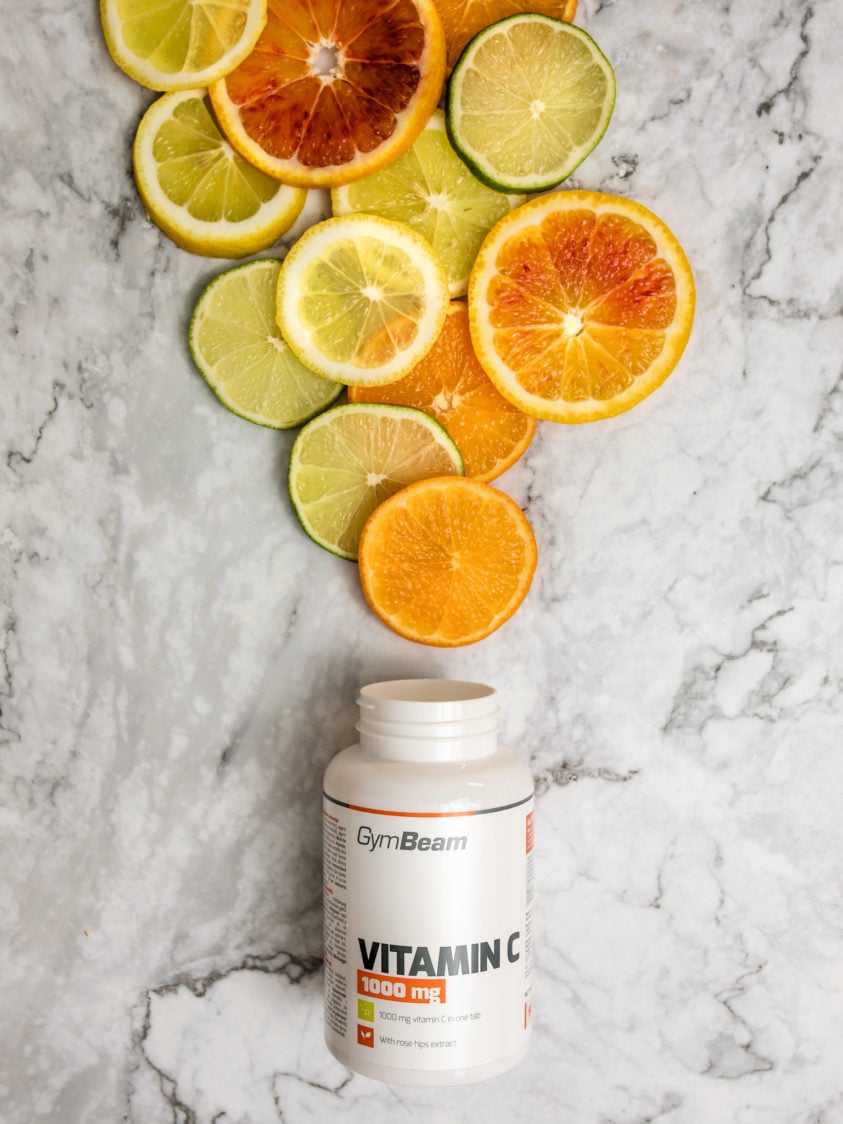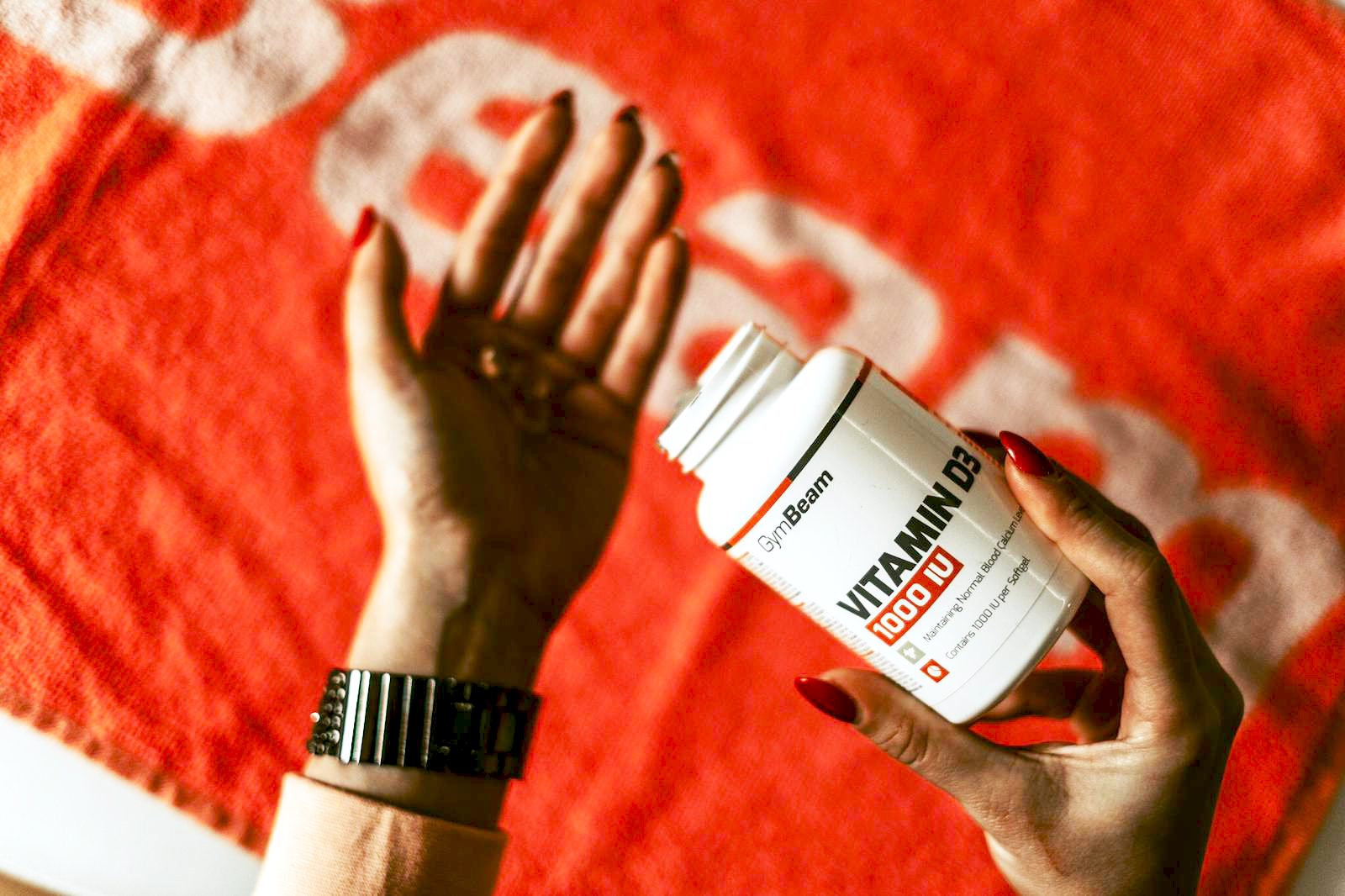Table of Contents
Are you troubled by a runny nose, cough, sore throat, or fever? These problems are mostly caused by viral diseases such as cold and flu which might cause you real trouble. Fortunately, there are several ways how to fight them. Take a look at the 9 nutritional supplements that will help you to fight flu and cold.
Immunity is the backbone of health
There is nothing pleasant about cold and flu, and before these diseases will affect you, you should focus on reducing the risk of developing them. The first step is to strengthen your immunity which is the key to preserving the health of the body. It protects the organism from many parasites, viruses, and bacteria that cause different diseases. [1]
The immune system is divided into two forms. The first one is the natural immunity with which we are already born and the second one is acquired immunity. We acquire it gradually during life and we can support its functioning under certain circumstances. We can strengthen the immune system with a balanced diet, exercise, quality sleep, but also regular hand washing and proper nutritional supplements. [1] To learn more about the factors that affect immunity, read our article How to strengthen immunity and body resistance against diseases?

Cold and flu
Cold and flu are contagious respiratory viral diseases. Their symptoms are similar, but they are slightly different. While the cold is relatively fast to fully recover from and all you need are a few days in the bed, with the flu it’s more challenging. It is mostly accompanied by more intense manifestations, and the lack of treatment can lead to pneumonia. As these are viral diseases, antibiotics are not effective in their treatment. Antibiotics help to cure only bacterial infections. [2]
Cold symptoms
The common cold is an acute viral infection of the upper respiratory tract, which affects the nose, cavity, pharynx, larynx, and spreads mostly through a person to person contact. The incubation period varies, but with the cold, it is usually less than two days. The symptoms that usually affect infected mucous membranes last 3-7 days, although occasionally they can persist for three weeks, especially if the cold is not treated. [2] [3]
The common cold usually begins with the following symptoms:
- sore throat
- sore throat
- snuffles
- sneezing
- fatigue
- cough
Flu symptoms
Flu is a contagious respiratory disease caused by flu viruses that infect the nose, throat, and sometimes lungs. One way to prevent flu is to vaccinate against it. Most experts believe that flu viruses spread mainly through the tiny drops that arise during coughing, sneezing, or speaking. Less often a person may experience flu by touching the surface or object on which the flu virus is, and then by transferring it to the mouth, nose, or eyes. [2] [3]
The main difference between cold and flu lies in the fact that the cold begins gradually, while the flu will hit quickly and cause more severe symptoms.
The flu usually has the following symptoms:
- fever
- muscle and joint pain
- red skin
- red eyes
- chills
- headache
- dry cough
- sore throat
- occasionally stomach problems and diarrhea
Some symptoms may indicate that the disease is really serious. You should seek medical advice if you suffer from the following problems:
- difficulty breathing or shortness of breath
- pain or tightness in the chest and abdomen
- sudden dizziness
- severe vomiting
- very high non-declining fever

You might be interested in these products:
How to treat symptoms of cold and flu at home?
Treatment of cold and flu focuses primarily on relieving their symptoms. Read some tips on how to get home treatment for these diseases and their symptoms.
- Often blow your nose (in the right way) – it’s important that you get the harmful mucus out of your body and stop pulling it into yourself. Regular nose blowing is the basis for the treatment of acute cold and respiratory problems. By doing that you’ll get all the pollutants out. One of the best practices has turned out to be the cleaning of one hole after the other. This means that you can press the finger to push one hole while you are blowing out the other.
- Rinse the nose with salt water – to remove the contaminants from the respiratory organs the salt solution can help. This releases the blockage of the nose while removing viral particles and bacteria. Mix 1/4 teaspoon of salt and 1/4 teaspoon baking soda in warm water. Then inject the solution individually into each nostril by using a wider syringe and allow to run freely. You can also buy a ready-to-use salt solution at the pharmacy.
- Treat yourself to rest and stay warm – it’s not just a case of flu or cold, but with almost every weakening of the body and disease, resting is a key aspect in their treatment. You can help your body to direct the focus to fight viruses and give it the necessary regeneration.
- Gargle – gargling can moisturize the throat and bring temporary pain relief. Try the above-mentioned salt solution or herbal teas, such as chamomile. Also effective is the gargle made of honey and apple cider vinegar.
- Drink hot fluids – hot fluids relieve nasal congestion, prevent dehydration, and soothe unpleasant inflamed membranes that plague your nose and throat. If you are so exhausted that you cannot sleep at night, make a cup of herbal tea.
- Apply cold towel wrapping – if you are worried about a high fever and you want to reduce it, try to wrap the chest in a cold towel. This will help to reduce temperature and you will be relieved. Remember, however, the fever is a symptom of a successful fight of your body with viruses, you have to step in when the temperature is too high.
- Eat the right foods – if you are experiencing diarrhea in your viral diseases, try the effective foods, such as banana, dry rice, or blueberry, that cause mild constipation and treat intestinal problems. Such foods like chilly peppers, for example, open the cavities and help to fight the mucus in the lungs. The horseradish or mustard have the same effects. The onion, in turn, contains phytochemicals designed to help the body to remove bronchitis and other infections. Black and green tea contains catechin, a phytochemical that has natural antibiotic and anti-diarrhea effects. Be careful with the citrus fruits, if you were to drink 100% citrus juice, your problems like sore throat and sputum would multiply. [4]

Supplements that help fight cold and flu

Vitamin C
Vitamin C serves as a supplement for the prevention and treatment of a cold. In general, it helps strengthen immune cells which protect us from pathogens. This means that its regular usage should serve you as a precaution to prevent you from a cold or flu virus. [5]
Vitamin C is also highly concentrated in immune cells and is rapidly exhausted during the infection. Vitamin C deficiency in fact significantly weakens the immune system and increases the risk of developing infections. For this reason, it is good to get enough vitamin C during the infection. If you already suffer from these problems, vitamin C may, according to some study, help shorten the time of cold. People who regularly use vitamin C may expect to shorter duration of cold with less severe symptoms. Studies also show that athletes who regularly use vitamin C are less likely to develop viral diseases than those who do not. [5] [6] [7]
The optimal daily dose of vitamin C varies on average from 1000 to 2000 mg, depending on the age and bodyweight of a person. However, it should be noted that non-consumed vitamin C is excreted from our body through urine every day,so it is not possible to overdose with it. To learn more about vitamin C and its effects, read our article Vitamin C: Everything you need to know about it before it’s too late.
Vitamin D
Scientists believe that predisposition to flu and cold in winter may be related to lesser exposure to sunlight, and thus lower production of vitamin D. Studies have found that people with low levels of vitamin D are more prone to develop respiratory diseases. [7] [8]
Vitamin D receptors are commonly found in the body, so they are involved in many cell processes, including the regulation of immune cells during infections, so it should not be surprising that its deficiency can disrupt immunity. Vitamin D regulates several disease-related immune factors and recent studies have shown that the addition of vitamin D can reduce the risk of developing flu. [7] [8] Read our article vitamin D and everything you need to know about it to see what other benefits this micronutrient has.

Vitamin A
Vitamin A is one of the most important micronutrients for a healthy immune system. It is essential to maintain ahealthy vision, promote growth, and protect healthy sputum in the body. It is known as an anti-inflammatory vitamin, because it has a decisive role in strengthening immune functions and participates in regulatory tasks in cells and hormones of the immune system. Many renowned studies have also shown its effects in the treatment of infectious diseases. [7] [9] [10]
Vitamin A is commonly found in many foods such as carrots, sweet potatoes, cabbage, red pepper, apricots, or egg yolk. Its great drawback is that when you exceed its use it can be toxic and cause dizziness, nausea, or headache. Pregnant women should also be particularly cautious because excessive use of vitamin A can lead to congenital fetal defects. The optimal daily dose in adult people should be approximately 2300 UI. [9] [10]
Group B vitamins
This complex of B vitamins is synergistic in regulating several vital functions in our body. Not only it strengthens immunity but its supplementation should be a regular thing even when you are healthy, in addition, it helps to cope with stress, increases energy, and is particularly important to receive it during physical and psychological performance. It may be the cold and the flu, during which our body deplete all our energy, which needs to be supplemented so that our organism can handle the fight against the virus. [11]
A particularly important fighter against infectious diseases is vitamin B6, i.e. pyridoxine. It performs more than 100 enzymatic reactions, including the metabolism of proteins in the body. It also participates during brain development, the functioning of the nervous system and works closely with the immune system, to prevent infections such as spreading flu. One of the characteristic signs of vitamin B6 deficiency is in fact weakened immune system and reduction in serum antibody production. This will increase the predisposition to flu and other respiratory infections. [11] [12]

Zinc
Zinc is a strong micronutrient that most commonly occurs in proteins and is essential for neurocognitive health, wound healing and defense of the immune system against infectious bacteria and viruses. In fact, the supplementation of zinccan limit the replication of the virus in the nasal epithelial and reduce inflammation of the airways. [7] [12] [13]
A recent review of studies has dealt with vitamins and mineral substances in the treatment of cold and flu. They have shown that taking 70 mg of zinc a day has helped relieve symptoms if taken within 24 hours from the appearance of symptoms of these diseases. Therefore, this mineral is a key ingredient in many tablets and sprays for sore throat or cold. Another study also found that it helped reduce the duration and severity of the cold. [15] Excessive use of zinc may, conversely, suppress the function of the immune system, therefore it is recommended not to exceed the daily dose of 70 mg of zinc. Scientists have also found that zinc helps control the infection so that it inhibits a certain protein, thus preventing the emergence of excessive inflammation. Therefore, zinc supplementation may be extremely beneficial for very sick or elderly patients who are dependent on intensive care. [7] [12] [13]
Curcuma and Ginger
Curcuma (turmeric) and ginger are two superfoods that have found widespread use in natural medicine. The healing effects of ginger are caused by the presence of phenolic compounds, such as Gingerol, which has strong anti-inflammatory and antioxidant effects. Turmeric, in turn, hides the substance curcumin, which has been shown to assist in the treatment and prevention of several chronic inflammations. In addition, curcumin increases the level of a proteincalled the cathelicidin antimicrobial peptide or CAMP, which helps prevent infections and fights against unknown bacteria and viruses. [16] [17] [18]
Some researches show that in particular, Ginger may strongly increase the immunity. One study found that ginger extract blocks the growth of several strains of respiratory pathogens. [19]
Turmeric and ginger can, therefore, reduce the level of inflammation which can help improve immune function and help to combat cold, flu, or other inflammatory diseases.[16] If you want to learn more about the Curcuma, read our article Turmeric – a spice rich in antioxidants and a fighter against inflammation.

Probiotics
Probiotics are live bacteria and yeast that help reduce the number of “bad” bacteria that cause disease and inflammation and replace them with “good” bacteria. They help to balance the intestinal microbiome, which improves not only digestion but also immunity. Probiotics are commonly found in foods such as yogurt, kimchi, sour cabbage, or you can get it into your body through dietary supplements. [7] [20] [21]
According to several findings, probiotic prophylaxis may shorten the duration of upper respiratory tract infection,and reduce the duration of the disease. Studies have also shown that probiotics can protect the body from viral infections and reduce the risk of getting a cold. The probiotic bacteria and their cell walls have a significant impact on the functionality of the mucous membrane due to the activation of multiple immune mechanisms. Probiotics have been found to strengthen the effectiveness of the flu vaccine if taken during its application. [7] [20]
Probiotics are often recommended in the form of supplements as a complement to various diseases that are treated with antibiotics or other prescription drugs. This is due to their beneficial effects on the health of the gastrointestinal tract and its problems such as inflammatory bowel disease, diarrhea or irritable bowel syndrome. These problems are troubling people who have had the flu or other viral disease. [21] If you want to know more about probiotics, read our article Probiotics: The importance of beneficial bacteria for immunity and the overall health of athletes.

Glutamine
Glutamine is a non-essential amino acid, most commonly stored in skeletal muscle and lungs. Although it is not its primary function, Glutamine can help in times of illness, stress or injury. As well as other amino acids, glutamine plays an important role in protein synthesis. In addition, it helps to remove ammonia from the body and promotes the functioning of the immune system or brain. Studies suggest that Glutamine can strengthen the immune system and reduce the risk of infection after surgery. [25] [26]
It is no secret that strong strength training in combination with intensive exercise can absorb too much of the stock of glutamine and thus reduce the function of the immune system. Studies also show that strenuous exercise reduces the concentration of glutamine in the blood. Some studies have also found that glutamine can in the endurance athletesreduce the probability of developing the disease. [25] [26]
Echinacea
Echinacea is a popular herb that has been used in natural medicine to treat many diseases for centuries. Nowadays, you will find it as part of the non-prescription drugs to treat cold, flu or upper respiratory diseases. In daily use, Echinacea may reduce the risk and duration of respiratory infections. [7] [22]
The extracts from Echinacea have an effect on the immune system and defend your body against the disease germs. Research shows that it can increase the number of white blood cells that are fighting against infections. Numerous studies have also found that this plant can help your immune system fight infections and viruses, and thus helps to recover from the disease more quickly. The use of Echinacea reduced the risk of developing colds in more than 50% tested and reduced the duration of the disease by one and a half days. [22] [23] [24]
It is important to note that dietary supplements mentioned above are not primarily intended for the treatment of cold or flu. Their main effect is strengthening the immune system and primarily serving as prevention. However, several studies have shown that the use of these supplements is effective in the fight against cold and flu, and so you should consider their supplementation during the time when these diseases occur. If you liked the article about 9 nutritional supplements that can help you with flu and cold, we would be grateful for your sharing.
[1] Hannah Nichols - Tips for a healthy immune systém – https://www.medicalnewstoday.com/articles/320721
[2] Flu or Cold Symptoms? – https://www.webmd.com/cold-and-flu/flu-cold-symptoms#1
[3] Cameron White, MD - The Difference Between the Cold and Flu – https://www.healthline.com/health/cold-flu/cold-or-flu
[4] 12 Natural Treatment Tips for Colds and Flu – https://www.webmd.com/cold-and-flu/12-tips-prevent-colds-flu-1#1
[5] Zad Rafi - Which supplements can help against colds and the flu? – https://examine.com/nutrition/supplements-for-cold-and-flu/
[6] Carr AC, Maggini S - Vitamin C and Immune Function – https://www.ncbi.nlm.nih.gov/pubmed/29099763
[7] Mariangela Rondanelli, Alessandra Miccono, Silvia Lamburghini, Ilaria Avanzato, Antonella Riva, Pietro Allegrini, Milena Anna Faliva, Gabriella Peroni, Mara Nichetti, and Simone Perna - Self-Care for Common Colds: The Pivotal Role of Vitamin D, Vitamin C, Zinc, and Echinacea in Three Main Immune Interactive Clusters (Physical Barriers, Innate and Adaptive Immunity) Involved during an Episode of Common Colds—Practical Advice on Dosages and on the Time to Take These Nutrients/Botanicals in order to Prevent or Treat Common Colds – https://www.ncbi.nlm.nih.gov/pmc/articles/PMC5949172/
[8] Gerry Schwalfenberg - Vitamin D for influenza – https://www.ncbi.nlm.nih.gov/pmc/articles/PMC4463890/
[9] Melissa Sammy - Fight the cold and flu with these 6 key nutrients – https://www.mdlinx.com/internal-medicine/article/5540
[10] Zhiyi Huang, Yu Liu, Guangying Qi, David Brand and Song Guo Zheng - Role of Vitamin A in the Immune System – https://www.ncbi.nlm.nih.gov/pmc/articles/PMC6162863/
[11] Erin Brodwin - Here's the only supplement you should take for your cold – https://www.businessinsider.com/colds-flu-vitamins-supplements-2016-12
[12] Rall LC, Meydani SN - Vitamin B6 and immune competence. – https://www.ncbi.nlm.nih.gov/pubmed/8302491
[13] Zinc [https://www.webmd.com/vitamins-and-supplements/supplement-guide-zinc#1
[14] Goutham R and Kate Rowland - Zinc for the common cold—not if, but when – https://www.ncbi.nlm.nih.gov/pmc/articles/PMC3273967/
[15] Hemilä H, Chalker E - The effectiveness of high dose zinc acetate lozenges on various common cold symptoms: a meta-analysis. – https://www.ncbi.nlm.nih.gov/pubmed/25888289
[16] Rachael Link, MS, RD - Can Ginger and Turmeric Help Fight Pain and Sickness? – https://www.healthline.com/nutrition/turmeric-and-ginger
[17] Mohd Yusof YA - Gingerol and Its Role in Chronic Diseases. – https://www.ncbi.nlm.nih.gov/pubmed/27771925
[18] Arshad Husain Rahmani, Mohammed A. Alsahli, Salah M. Aly, Masood A. Khan and Yousef H. Aldebasi - Role of Curcumin in Disease Prevention and Treatment – https://www.ncbi.nlm.nih.gov/pmc/articles/PMC5852989/
[19] Akoachere JF, Ndip RN, Chenwi EB, Ndip LM, Njock TE, Anong DN - Antibacterial effect of Zingiber officinale and Garcinia kola on respiratory tract pathogens. – https://www.ncbi.nlm.nih.gov/pubmed/12630492
[20] Salynn Boyles - 'Good' Bacteria: Good for Colds? – https://www.webmd.com/cold-and-flu/news/20051107/good-bacteria-good-for-colds#1
[21] Louisa Richards - A guide to the best probiotics – https://www.medicalnewstoday.com/articles/327389
[22] Ryan Raman, MS, RD - Echinacea: Benefits, Uses, Side Effects and Dosage – https://www.healthline.com/nutrition/echinacea
[23] Melchart D, Linde K, Worku F, Bauer R, Wagner H - Immunomodulation with echinacea - a systematic review of controlled clinical trials. – https://www.ncbi.nlm.nih.gov/pubmed/23195946
[24] Zhai Z, Liu Y, Wu L, Senchina DS, Wurtele ES, Murphy PA, Kohut ML, Cunnick JE - Enhancement of innate and adaptive immune functions by multiple Echinacea species. – https://www.ncbi.nlm.nih.gov/pubmed/17887935
[25] Roth E, Spittler A, Oehler R - – Glutamine: effects on the immune system, protein balance and intestinal functions]. [https://www.ncbi.nlm.nih.gov/pubmed/9045524
[26] Marie Spano - How Glutamine Can Ward Off The Common Cold! – https://www.bodybuilding.com/fun/how-glutamine-helps-fight-colds.htm


Add a comment